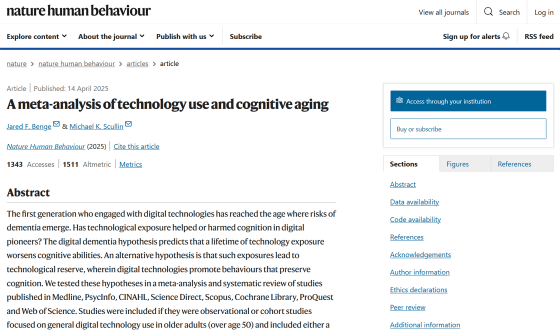Research shows that older adults who use new technology have a lower risk of dementia and cognitive decline

As convenient technologies such as search engines and social networking sites develop, some people claim that 'if we rely too much on technology, we stop using our brains and our cognitive function declines.' However, a new study targeting middle-aged and elderly people aged 50 and over has shown that the more technology people use, such as smartphones and social networking sites, the lower their risk of dementia and cognitive decline.
A meta-analysis of technology use and cognitive aging | Nature Human Behavior

Digital Dementia: Does Technology Use by 'Digital Pioneers' Correlate to Cognitive Decline? | Media and Public Relations | Baylor University
https://news.web.baylor.edu/news/story/2025/digital-dementia-does-technology-use-digital-pioneers-correlate-cognitive-decline
Technology Use Linked to Better Brain Health in Older Adults - UT Austin News - The University of Texas at Austin
https://news.utexas.edu/2025/04/14/technology-use-linked-to-better-brain-health-in-older-adults/
Using Tech as You Get Older Could Reduce Your Risk of Dementia : ScienceAlert
https://www.sciencealert.com/using-tech-as-you-get-older-could-help-reduce-your-risk-of-dementia
The generation that became familiar with digital technologies such as computers and the Internet in their youth are now in their 50s and 60s and are at increased risk of dementia. Scientists are asking the question: Is there a relationship between the use of digital technology and an increased risk of dementia?
In modern society, if you don't understand something about a certain topic or word, you can quickly find the answer by searching the Internet. Also, by browsing social media or video sites, a wide variety of content is always available, making it easy to obtain stimulation and pleasure. Some people are concerned that continued dependence on these technologies will lead to a decline in cognitive abilities.
'Turn on the news any day and you'll hear about how technology is harming us,' said Michael Scullin, associate professor of psychology and neuroscience at Baylor University in the US. 'People often use terms like 'brain drain' and ' brain rot' and now we've seen 'digital dementia.' As researchers, we wanted to know if this was true.'

Scullin and his team, including neuropsychologist Dr.
Statistical analysis found that technology use was correlated with a 58% lower risk of cognitive impairment, and that people over the age of 50 who used technology were 26-34% less likely to experience cognitive decline over time.
This study only examined associations and did not show a direct causal relationship. Furthermore, the included studies used different approaches, with some focusing on smartphones as technology use and others on social media use. Nevertheless, the association between technology use and reduced risk of cognitive decline was maintained even when factors such as occupation, education, and socioeconomic status were taken into account.
One mechanism by which technology may maintain cognitive function is that it may help maintain social connections. Technologies such as video calling, email, and messaging apps promote communication and engagement between people, helping older adults connect with society and their families and reducing loneliness and isolation.
In addition, dementia is diagnosed when cognitive decline makes daily life difficult, but technologies such as smartphone and PC reminder functions, GPS navigation, and online banking may make it easier for older people to live independently even if their cognitive function declines to some extent. The research team calls this role of technology 'digital scaffolding.'

'Far from causing 'digital dementia' as some have feared, engagement with technology was consistently associated with improved brain health, even after accounting for education, income and physical health,' said Benge. 'Our data suggests that encouraging older adults to engage with technology, particularly in ways that help them challenge, connect and compensate for cognitive challenges, could be a powerful approach to promoting cognitive health.'
'If you have parents or grandparents who are shying away from technology, it's time to reassess them,' Scullin said. 'Can they get their kids to use photo, messaging and calendar apps on a smartphone or tablet? Start simple and be patient as you teach them.'
in Mobile, Web Service, Science, Posted by log1h_ik